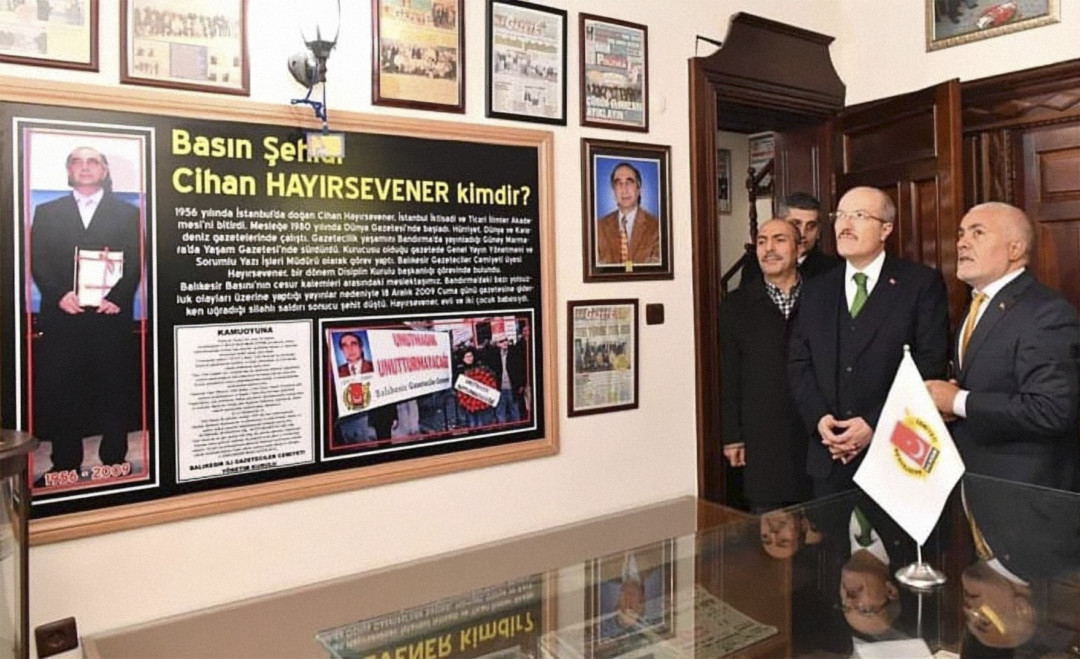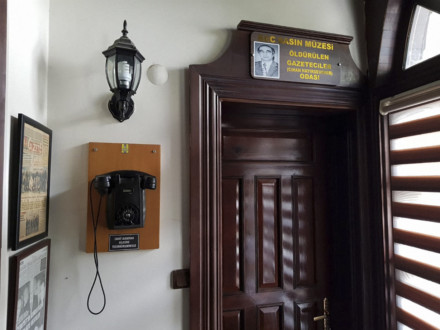19 December 2009
Bandirma, Turkey
Cihan Hayirsevener
Profession
Media
Motive
Exposure of illegal activity
Political dissent
Whistleblowing


Adolfo Olivas


Ahmed Divela


Amit Jethwa


Artan Cuku


Babita Deokaran


Bayo Ohu


Berta Cáceres


Bhupendra Veera


Bill Kayong


Boris Nemtsov


Boško Buha


Chai Boonthonglek


Charl Kinnear


Chut Wutty


Chynybek Aliev


Cihan Hayirsevener


Daphne Caruana Galizia


Darío Fernández


Derk Wiersum


Deyda Hydara


Édgar Quintero


Edmore Ndou


Edwin Dagua


Federico Del Prete


Fernando Villavicencio


Gezahegn Gebremeskel


Gilles Cistac


Habibur Mondal


Igor Alexandrov


Jacob Juma


Ján Kuciak


Javier Valdez


Joannah Stutchbury


José Ángel Flores


Jules Koum Koum


Kem Ley


Luis Marroquín


Mahamudo Amurane


Marcelo Rivera


María Elena Ferral Hernández


Marielle Franco


Milan Pantić


Milan Vukelić


Muhammad Khan


Nelson García


Nihal Perera


Oliver Ivanović


Orel Sambrano


Perween Rahman


Peter R. de Vries


Rajendra Singh


Salim Kancil


Sandeep Sharma


Sikhosiphi Radebe


Slaviša Krunić


Soe Moe Tun


Victor Mabunda


Virgil Săhleanu


Wayne Lotter


Yuniol Ramírez


Zezico Guajajara
19 December 2009
Bandirma, Turkey
Profession
Media
Motive
Exposure of illegal activity
Political dissent
Whistleblowing
On 19 December 2009, 53-year-old journalist Cihan Hayirsevener was shot on his way home in Bandirma, a port town on the Sea of Marmara in north-west Turkey. The assailant immediately fled the crime scene in a vehicle that was waiting for him.
Several hours later, local police announced that Hayirsevener had lost his life at the Uludag University Hospital in the neighbouring city of Bursa. The announcement was intended to prevent social unrest from breaking out in Bandirma. In truth, according to the author’s sources, Hayirsevener had lost his life in the ambulance on the way to the hospital. The bullet had severed a major artery in his left leg, and he succumbed to heavy loss of blood.
At the time, Hayirsevener was the managing editor at Güney Marmara’da Yaşam (meaning ‘life in South Marmara’), a daily newspaper he’d founded that covered local societal, political and economic news. Located in the province of Balikesir some 116 kilometres south of Istanbul, Bandirma has a population of more than 150 000 people, and is home to one of Turkey’s major ports.
Before his death, Hayirsevener had been investigating and reporting on several corruption cases that involved the Bandirma municipality, the town’s mayor and several local businessmen. According to his colleagues and family, he had received several death threats.
‘I am afraid. I think they will do something treacherous. I feel that something bad will happen,’ Hayirsevener had told his friend and colleague, Ramazan Demir, onboard a ferry to Istanbul just two days before the murder. Demir added: ‘He said that he would tell me everything in the next [couple of] days, but that never happened …
‘Cihan was a senior journalist who had worked at leading national media houses. He later moved to Bandirma [in 1999], a town he loved. He started to cover the town as a journalist and investigated very troublesome topics,’ Demir explains.
Demir is chair of the Balikesir Journalists’ Association. Hayirsevener had encouraged him to run for this position, as he thought the organization could serve its cause more effectively. Later, both Demir and Hayirsevener joined the administration of the association. At the time of his murder, Hayirsevener was a member of the association’s disciplinary committee.
Hayirsevener’s funeral ceremony was held in Istanbul on 22 December 2009. He had previously worked in the city, and his family still lived there. Family, friends, journalists, representatives from the association, human-rights groups and many other people attended the service. ‘The reason why he was murdered was that he did his job and wrote the truth,’ said Demir, recalling what the journalist’s daughter, Gaye Hayirsevener-Clifford, had said at the ceremony. Later, in an interview with the Turkish daily, Vatan, she said: ‘My father was a hero. He worked as a journalist for 29 years. He loved Bandirma and Balikesir and dedicated his life to fighting against crime gangs and corruption, which only harm the city.’
According to the Committee to Protect Journalists, Hayirsevener had been reporting on a local corruption scandal involving three owners of Ilkhaber, a daily newspaper in Bandirma. They were found guilty of accepting cash pay-outs from a former mayor. Before his death, Hayirsevener’s investigation was believed to be focusing on what the payments had been intended for.
‘At the time of the murder, the owners of Ilkhaber were already in prison, but it didn’t stop them from taking Cihan’s life. Those people even owned a media house as a vehicle to blame other groups and promote themselves and their interests. Cihan had revealed their politically linked underground life, and the media started to cover this issue, thanks to Cihan’s efforts,’ Demir said. The corruption scandal amounted to some 20 million Turkish lira (close to US$13 million at the 2009 exchange rate). It included the construction of a thermal power plant, which Hayirsevener and his media house criticized.
At the time of the murder, the owner of Ilkhaber Media, Ihsan Kuruoğlu, was in prison on previous corruption charges. In 2013, he was sentenced to 17 years for masterminding and ordering Hayirsevener’s murder, and another 10 years for establishing an armed crime organization, violating firearms law, and corruption charges. Surprisingly, the court also ruled that Hayirsevener’s writing about Kuruoğlu was a reason for an unjust provocation.
Hayirsevener’s killer, Serkan Erakkus, was sentenced to life. Five other Kuruoğlu family members and Ilkhaber Media workers were sentenced to terms that varied from two to 11 years.

A room at the Balikesir Journalists' Association offices dedicated to Cihan Hayirsevener

Reporters Without Borders (RSF in French) said it welcomed the court’s ruling. ‘The decision is an encouraging one for all reporters in Turkey who were attacked and threatened by powerful local interest groups. However, the court’s interpretation of the unjust provocation was intolerable after the death of journalist Hayirsevener,’ RSF said, as Bia.net reported.
‘Being a local journalist is a very hard job. First, you always have financial issues and you do not have the support of national media. Cihan was receiving death threats but no one provided security for him,’ said Demir. ‘Cihan’s murder was a message to journalists about what may happen to them when they report the truth about organized-crime groups and other dark structures. Unfortunately, nothing got better after Cihan’s death and the court ruling.’
Demir and his association think that only journalists can protect journalists though their solidarity. Every year, the Balikesir Journalists’ Association Organizes events to commemorate Hayirsevener and his murder to raise public awareness about the protection of journalists. ‘We organize events at the anniversary of Cihan’s murder; we tell his story to people. We also have a room dedicated to Cihan, which is open to visitors. We have not forgotten and will not forget Cihan,’ Demir adds. Hayirsevener was also acknowledged as a martyr for press freedom by the Turkish Journalists’ Association.
The author would like to thank the Balikesir Journalists’ Association for sharing photos from its archive.


8 April 2017
Tirana, Albania
Artan Cuku


27 February 2015
Moscow, Russia
Boris Nemtsov


10 June 2002
Belgrade, Serbia
Boško Buha


16 October 2017
Bidnija, Malta
Daphne Caruana Galizia


18 September 2019
Amsterdam, Netherlands
Derk Wiersum


18 February 2002
Casal di Principe, Italy
Federico Del Prete


1 July 2001
Slavyansk, Ukraine
Igor Alexandrov


21 February 2018
Veľká Mača, Slovakia
Ján Kuciak


11 June 2001
Jagodina, Serbia
Milan Pantić


6 November 2007
Banja Luka, Bosnia and Herzegovina
Milan Vukelić


16 January 2018
North Mitrovica, Kosovo
Oliver Ivanović


15 July 2021
Amsterdam, The Netherlands
Peter R. de Vries


22 April 2019
Banja Luka, Bosnia and Herzegovina
Slaviša Krunić


7 September 2000
Iași, Romania
Virgil Săhleanu